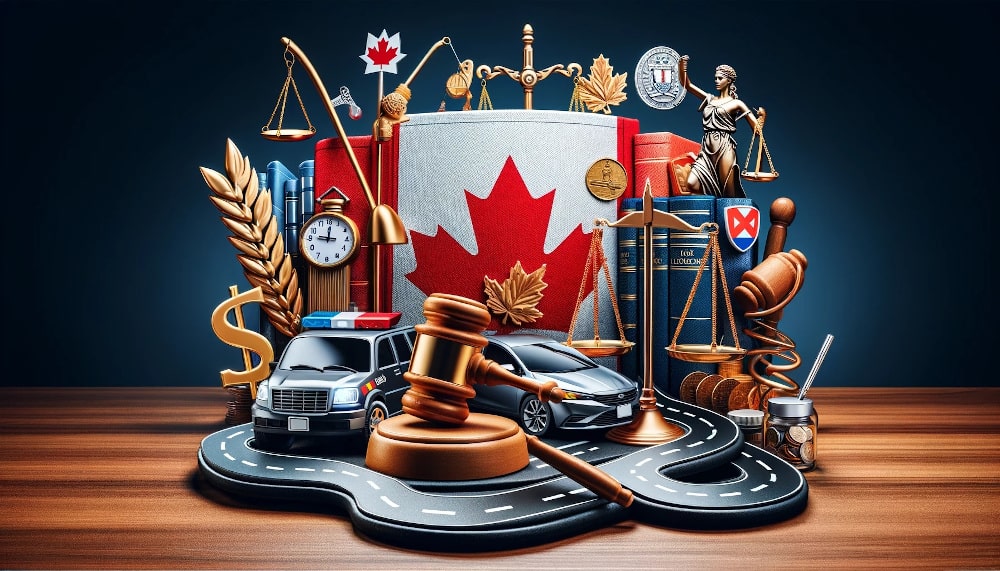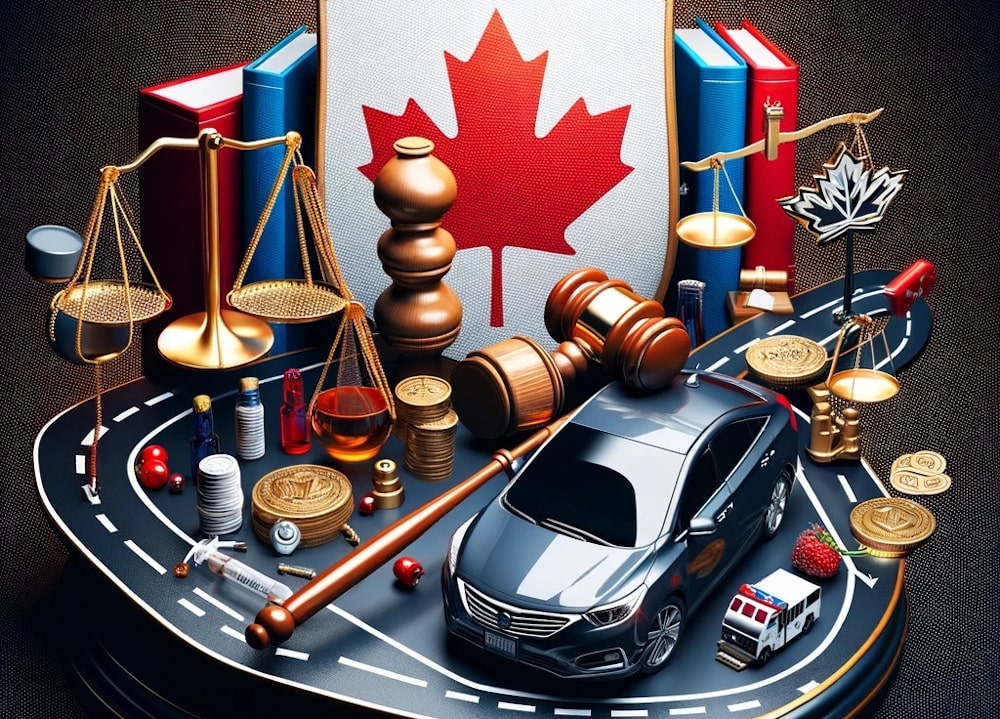
According to the latest Statistics Canada data, Ontario’s Peel Regional Police arrested 1,030 motorists for driving under the influence (DUI) of alcohol and/or drugs in 2022. While it’s unclear how many of those arrested for impaired driving were from Mississauga, the proportion is likely significant, as the city represents about half of the Peel Region’s population.
Whether drunk driving or drugged driving, DUI laws in Ontario mandate severe impaired driving penalties in Mississauga. Impaired driving in Canada is considered a grave threat to road safety, a factor Mississauga traffic laws strive to address.
Let’s take a closer look at the driving laws that regulate driving while impaired in Mississauga, or anywhere in Canada. If you do become a DUI arrest statistic, know that your best option for avoiding the onerous penalties that come with a conviction is to hire the services of a highly competent criminal lawyer in Mississauga.
Impaired Driving Meaning
If asked what is “DUI” or what impaired driving means, you might think the answers are self-evident. A drugged or drunk driver is driving under the influence, and thus driving while impaired. However, it’s important to clarify what constitutes being “under the influence” or “too impaired” to drive.
Canada’s Criminal Code does this under Section 320.14, with specific legal descriptions of what constitutes operational impairment warranting distinct DUI charges under the law:
- Operating a motor vehicle while your “ability to operate it is impaired to any degree by alcohol,” drugs, or a combination thereof.
- Having a blood alcohol concentration (BAC) equal to or exceeding 80 mg of alcohol in 100 mL of blood within two hours of operating a motor vehicle.
- Having a blood drug concentration equal to or exceeding the blood drug concentration for the drug prescribed by regulation within two hours of operating a motor vehicle.
- Within two hours of ceasing motor vehicle operation, having a BAC and blood drug concentration equal to or exceeding the above-described levels.
How Legal Descriptions Are Used to Bring Charges
If Peel Regional Police charge you with a DUI offence based on the first description, it is charged as “impaired driving.” This DUI charge is highly subjective, as it is based on physical evidence and police observations that alcohol and/or drugs compromised your ability to drive safely.
Evidence might include alcohol or drugs found in the vehicle, signs of alcohol or drug use within the car, witness testimony about your alcohol or drug consumption before driving, field sobriety testing results, and police descriptions of erratic or dangerous driving that could be attributed to impairment.
Police will often charge this type of DUI with other DUI-related charges to enhance the likelihood of a conviction. For example, if your defence successfully challenges a BAC-related charge, the Crown may still be able to introduce enough evidence to support an impaired driving charge.
The BAC-related “over 80-plus mgs” charge is based on an official breathalyzer reading that proves your blood alcohol level was at or above the 80 milligrams of alcohol in 100 millilitres of blood threshold when you were driving. This is the most frequently prosecuted DUI charge in Canada for several reasons.
First, courts consider breathalyzer readings among the most reliable evidence for a conviction. Second, police arrest far more people on suspicion of drunk driving than drugged driving – and, perhaps most importantly, refusing to provide a roadside or breathalyzer breath sample is also a criminal DUI-related offence under Section 320.15 of the Criminal Code. If convicted, you face the same severe penalties as handed down for other DUI offences.
The third legal description, which determines impaired driving by drugs, can be based on three different parameters: blood sampling, readings from an approved roadside drug screening device, an evaluation from a drug recognition expert, or a combination thereof. For cannabis — the most common drug-related DUI charge — five or more nanograms of THC per ml of blood is the legal threshold for laying criminal DUI charges.
In Ontario, police can issue a non-criminal administrative warning to those with THC levels between two and five nanograms per ml of blood.
The last legal description is used to lay charges against those suspected of being impaired by alcohol and drugs. The same factors used to determine impairment under the other legal descriptions are combined to lay these charges. For those with DUI charges based on cannabis and alcohol, the threshold is a combination of 2.5 nanograms or more of THC per ml of blood with 50 mg of alcohol per 100 ml of blood.
Penalties for an Impaired Driving Conviction in Mississauga
If you’re convicted of DUI-related charges in Mississauga or anywhere in Canada, you may receive severe penalties and suffer supplemental negative impacts on your life. A first-time conviction carries the following repercussions:
- One-year driver’s license suspension.
- $1,000 fine.
- Mandatory enrollment, with a $634 fee, in Ontario’s “Back on Track” education/treatment program.
- Re-licensing requirement to participate in a provincial Ignition Interlock program, with $1,000 or more in fees.
- $281 in fees to get your driver’s license reinstated.
- “High Risk” annual insurance premium increases for up to six years that range from $2,000 to $10,000 depending on your vehicle and other parameters.
- Permanent criminal record with likely impacts on employment and educational opportunities.
- Alternative transportation costs during license suspension.
- Potential impediments to international travel (especially to the U.S.).
Second-time Impaired driving convictions carry the same harsh penalties and impacts as the first one but ramp up the punishment with:
- A minimum 30-day jail term.
- Three-year license suspension.
- Longer ignition interlock periods post-license reinstatement.
- Potential court-ordered probation.
- Larger fines.
Subsequent convictions can lead to longer jail terms and permanent license suspension. Aggravating factors in any DUI that can result in even harsher penalties include:
- Excessive blood alcohol concentrations.
- Dangerous driving.
- Racing other vehicles.
- Operating a large motor vehicle.
- Having children in the car when arrested.
- Operating impaired as a commercial driver.
In addition, if your impaired driving was deemed responsible for a traffic accident that caused death or injuries, you may face significant prison time. The maximum penalty for impaired driving causing injury is 14 years imprisonment, while the maximum for causing death is life imprisonment.
The Crucial Role of Legal Representation in Mississauga Impaired Driving Cases
If you’re facing impaired driving charges in Mississauga or anywhere in the Greater Toronto Area, it is imperative to seek out the most highly competent criminal defence lawyer you can find. To secure a DUI conviction, Crown prosecutors must prove their case “beyond a reasonable doubt. Experienced criminal defence DUI lawyers are adept at exposing such doubt about the Crown’s evidence.
Police are human and make mistakes, and their investigative equipment is not always reliable. Actions they take before, during, and after your arrest can contradict the evidence they submit in court. Roadside testing devices and breathalyzers are subject to misuse and technical errors, and, if over the course of their duties, they fail to follow proper procedures, this could nullify evidence due to the breach of your Charter Rights.
To avoid becoming an impaired driving arrest statistic or, even worse, becoming the cause of a drugged or drunk driver accident, don’t ever get behind the wheel if you’ve been drinking or consuming drugs. Should you fail to heed this advice and find yourself charged with DUI in Mississauga or the Greater Toronto Area, secure the expert legal representation offered by our skilled criminal defence lawyers at Vilkhov Law by contacting us for a free, confidential consultation.







